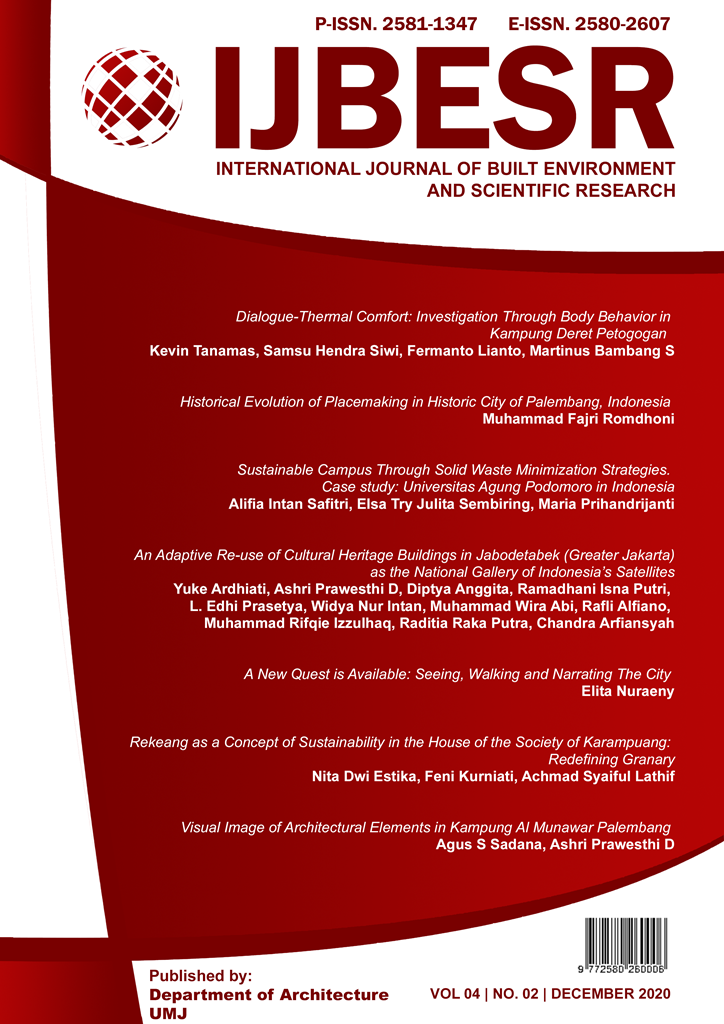Sustainable Campus Through Solid Waste Minimization Strategies (Case study: Universitas Agung Podomoro in Indonesia)
DOI:
https://doi.org/10.24853/ijbesr.4.2.101-114Keywords:
solid waste management, solid waste minimization, and sustainable campusAbstract
A large amount of solid waste (SW) generation becomes inevitable for campus due to its population and variety of activities. Therefore, it is a challenge to develop and implement SW minimization plan to encourage sustainable campus practices. The aim of this study was to develop sustainable strategies to support this plan for Universitas Agung Podomoro (UAP) included evaluating the SW management condition by monitoring the SW generation and surveying the perception and willingness to participate of campus society. The results showed that the SW generation was 52.63 kg/day or 0.08 kg/person/day. The composition consisted of 32.29% biodegradable and 67.71% non-biodegradable. The recycling potential was 61.01% consisted of 22.28% composting and 38.73% recycling. The social survey showed that respondents had positive perceptions about SW minimization. The complete evaluation resulted in the development of strategies to decrease the SW generation rate, increase the recyclable material rate, and increase the participation of campus society.References
Anne AE, Study of waste generation and composition as a basis for the design of waste collection systems in the campus area of the Universitas Indonesia (case study: 4 faculties and 1 facility on the Universitas Indonesia). Depok: Faculty of Engineering Universitas Indonesia; 2011. (in Bahasa Indonesia).
Dewilda Y, Julianto J. Assessment of waste recycling, composition, and potential as a basis for waste management in the campus area of the Universitas Putra Indonesia. Nat Sem on Develop of Sustain Region and City 2019: 1 (1):142–51. (in Bahasa Indonesia).
Banaget CK, Boedi GS, Kristanto A, D IG. Characteristics and potential of waste recycling in the Universitas Indonesia (case study: faculty of social and political sciences). Depok: Faculty of Engineering Universitas Indonesia; 2013. (in Bahasa Indonesia).
Ebrahimi K, North LA. Effective strategies for enhancing waste management at university campuses. Intl J of Sustain in Higher Educ 2016.
Bahçelioğlu E, Buğdaycı ES, Doğan NB, Şimşek N, Rich S, Alp E. Integrated solid waste management strategy of a large campus: A comprehensive study on METU campus, Turkey. J Clean Prod 2020; 265.
Tangwanichagapong S, Nitivattananon V, Mohanty B, Visvanathan C. Greening of a campus through waste management initiatives: Experience from a higher education institution in Thailand. Int J Sustain High Educ 2017: 18 (2): 203-17.
Damanhuri E, Padmi T. Integrated Waste Management. Second Edition. Bandung: ITB Press; 2015. (in Bahasa Indonesia).
Dhokhikah Y, Trihadiningrum Y, Sunaryo S. Community participation in household solid waste reduction in Surabaya, Indonesia. Resour Conserv Recycl 2015: 102 (09): 153–62.
Fatmawati S, Syahbana JA. Implementation of sustainable development policy in the campus environment (comparative study between Universitas Diponegoro at Tembalang and Universitas Nantes at Tertre). A Wil City Builder 2015: 11 (4): 484. (in Bahasa Indonesia).
Buana RP, Wimala M, Evelina Ri. Development of indicators for the participation of college management in implementing the green campus concept. Racana Reka 2018: 4 (2): 82–93. (in Bahasa Indonesia).
Hapsari ID, Sumarjiyanto BM N, Purwanti EY. Sustainable campus planning and budgeting: Universitas Diponegoro green campus. Technique. 2014: 35 (2): 86–93. (in Bahasa Indonesia).
Tansatrisna D. Community Perception and Participation in Household Waste Management. Bogor: Faculty of Human Ecology Institut Pertanian Bogor 2014: 1–24. (in Bahasa Indonesia).
Ifegbesan AP, Ogunyemi B, Rampedi IT. Students’ attitudes to solid waste management in a Nigerian University: implications for campus based sustainability education. Int J of Sustain in High Educ Information 2012.
Damanhuri E, Padmi T. Waste Management. Bandung: ITB Press; 2015. (in Bahasa Indonesia).
Ruslinda Y, Raharjo S, Susanti L. Study of the application of the concept of integrated waste management in the campus environment of Universitas Andalas. Pros SNSTL I 2014: 202–206. (in Bahasa Indonesia).
Qdais HA, Saadeh O, Al-Widyan M, Al-tal R, Abu-Dalo M. Environmental sustainability features in large university campuses: Jordan University of Science and Technology (JUST) as a model of green university. Int J Sustain High Educ 2019: 20 (2): 214-28.
de Vega CA, Benítez SO, Barreto MER. Solid waste characterization and recycling potential for a university campus. Waste Manag 2008: 28.
Song G, Zhang H, Duan H, Xu M. Packaging waste from food delivery in China’s mega cities. Resour Conserv Recycl 2018: 130 (11): 226-7.
Suryani AS. The role of waste bank in the effectiveness of waste management (case study of waste bank Malang). Aspiration 2014; 71–84. (in Bahasa Indonesia).
Wardiha MW, Putri PSA, Setyawati LM, Muhajirin. Waste generation and composition in office and wisma area (case study: Werdhapura Village Center, Denpasar, Bali). J Precipitation 2013: 10 (1): 7-17. (in Bahasa Indonesia).
Rajamanikam R, Poyyamoli G, Student PD, Venkataraman Nagar R. Towards zero-waste campus: compositional analysis of solid waste at the staff quarters to frame inclusive sustainable campus waste management system. Int J Innov Res Science Engineering 2014; 3 (4).
Mawonde A, Togo M. Implementation of SDGs at the University of South Africa. Int J of Sustain High Educ 2019: 20 (5): 932-950.







